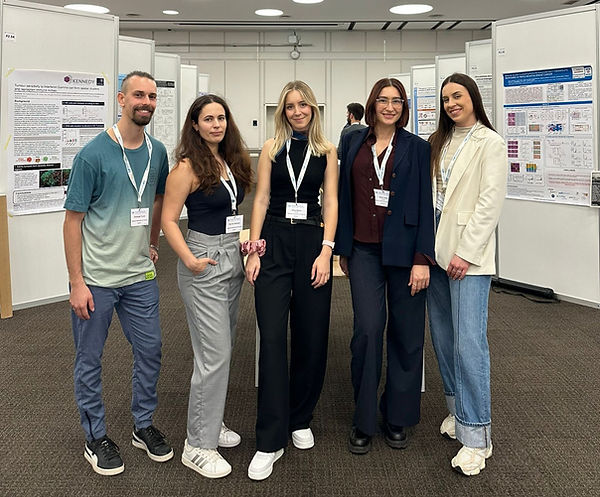
Research interests
Our main research goal is to unravel the contribution of key cellular signaling pathways to tumorigenesis. Our research tools are: Genetically modified mice modeling human cancer, genetically manipulated human and mouse cancer cell lines, tumor transplant models and human tumor samples.

KRAS driven lung adenocarcinoma
Lung cancer is the most frequent cancer with an aggressive clinical course and high mortality rates. Most cases are diagnosed at advanced stages when treatment options are limited and the efficacy of chemotherapy is poor. The disease has a complex and heterogeneous background with non-small-cell lung cancer (NSCLC) accounting for 85% of patients and lung adenocarcinoma being the most common histological subtype. Almost 30% of adenocarcinomas of the lung are driven by an activating Kirsten rat sarcoma viral oncogene homolog (KRAS) mutation. The ability to inhibit the oncogenic KRAS has been the holy grail of cancer research and the search for inhibitors is immensely ongoing as KRAS-mutated tumors are among the most aggressive and refractory to treatment. We are interested in therapeutic strategies tailored for KRAS driven NSCLC relying on the blockage of KRAS functional output, cellular dependencies, metabolic features and immunotherapy.


Selected publications
Uras, IZ, et al., KRAS mutated lung adenocarcinoma responds to pan-ERBB and Aurora kinase inhibitors. 2026. NPJ Precis Oncol. Available at: https://doi.org/10.1038/s41698-025-01242-8
Luca, AC, et al., Loss of SPHK1 fuels inflammation to drive KRAS-mutated lung adenocarcinoma. 2025. Cancer Letters. Available at: https://doi.org/10.1016/j.canlet.2025.217733
Caratti, B. et al., 2022. The glucocorticoid receptor associates with RAS complexes to inhibit cell proliferation and tumor growth. Science Signaling. Available at: DOI: 10.1126/scisignal.abm4452
Breitenecker, K. et al., 2021. Downregulation of A20 promotes immune escape of lung adenocarcinomas. Science Translational Medicine. Available at: https://doi.org/10.1126/scitranslmed.abc3911
Mohrherr, J. et al., 2019. JAK-STAT inhibition impairs K-RAS-driven lung adenocarcinoma progression. International Journal of Cancer. Available at: https://doi.org/10.1002/ijc.32624
Moll, H.P. et al., 2018. Afatinib restrains K-RAS-driven lung tumorigenesis. Science Translational Medicine. Available at: http://dx.doi.org/10.1126/scitranslmed.aao2301
Grabner, B. et al., 2015. Disruption of STAT3 signalling promotes KRAS-induced lung tumorigenesis. Nature Communications. Available at: http://dx.doi.org/10.1038/ncomms7285
Musteanu, M. et al., 2012. A mouse model to identify cooperating signaling pathways in cancer. Nature Methods. Available at: https://doi.org/10.1038/nmeth.2130
Group members

From left to right: Masa Beres, Iris Uras, Eva Putz, Katalin Kiss, Christoph Trenk, Marija Trkulja, Faith David, Yanira Longo, Herwig Moll, Monika Homolya, Sarah Trouvilliez, Michael Machtinger, Jaqueline Horvath and Emilio Casanova

Sarah´s grant celebration! 2026

Christmas party, Institute of Pharmacology, 2025, 2025

Christoph, Monika, Masa and MUV colleagues in the cancer immunity cycle meeting, Sitges, 2025

Summer party, celebrating grant money! 2025

Max celebrating his Master Thesis! 2025

Center retreat 2025

Monika Homolya receiving the poster prize at the CCC TRIO meeting! 2025



Contact
Emilio Casanova
Medical University of Vienna
Center for Physiology and Pharmacology
Institute of Pharmacology, first floor
Währinger Str. 13a
A-1090 Vienna,
Austria
Phone: 43 1 40160 31341
Fax: 43 1 40160 931300






